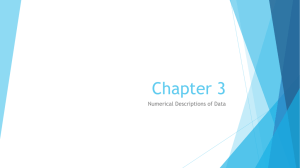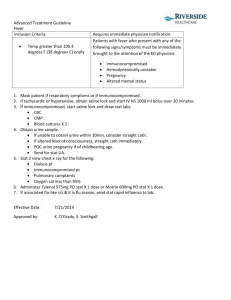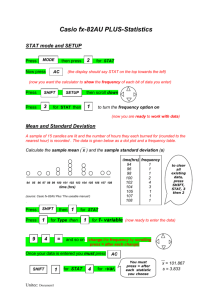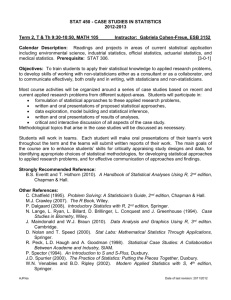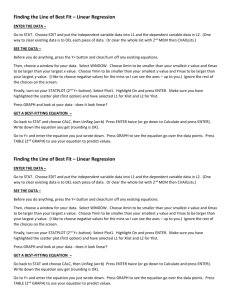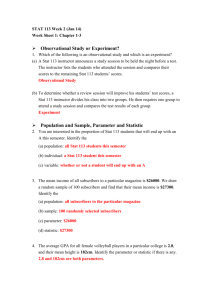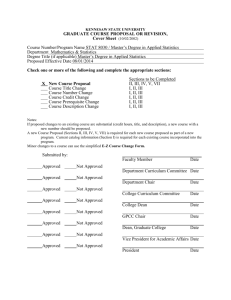Statistics: Statistical Science Emphasis
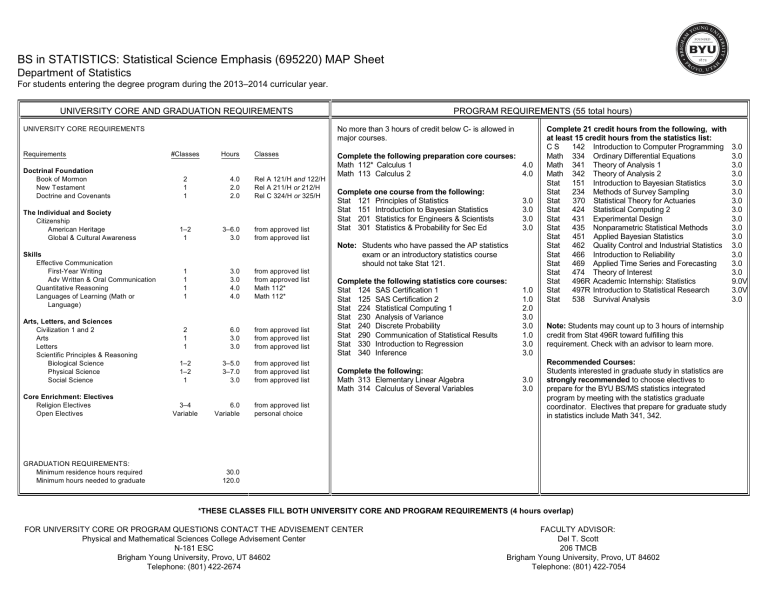
BS in STATISTICS: Statistical Science Emphasis (695220) MAP Sheet
Department of Statistics
For students entering the degree program during the 2013–2014 curricular year.
UNIVERSITY CORE AND GRADUATION REQUIREMENTS
UNIVERSITY CORE REQUIREMENTS
Requirements
Doctrinal Foundation
Book of Mormon
New Testament
Doctrine and Covenants
The Individual and Society
Citizenship
American Heritage
Global & Cultural Awareness
Skills
Effective Communication
First-Year Writing
Adv Written & Oral Communication
Quantitative Reasoning
Languages of Learning (Math or
Language)
Arts, Letters, and Sciences
Civilization 1 and 2
Arts
Letters
Scientific Principles & Reasoning
Biological Science
Physical Science
Social Science
Core Enrichment: Electives
Religion Electives
Open Electives
#Classes
2
1
1
1–2
1
2
1
1
1–2
1–2
1
1
1
1
1
3–4
Variable
Hours
4.0
2.0
2.0
3–6.0
3.0
3.0
3.0
4.0
4.0
6.0
3.0
3.0
3–5.0
3–7.0
3.0
6.0
Variable
Classes
Rel A 121/H and 122/H
Rel A 211/H or 212/H
Rel C 324/H or 325/H from approved list from approved list from approved list from approved list
Math 112*
Math 112* from approved list from approved list from approved list from approved list from approved list from approved list from approved list personal choice
PROGRAM REQUIREMENTS (55 total hours)
No more than 3 hours of credit below C- is allowed in major courses.
Complete the following preparation core courses:
Math 112* Calculus 1
Math 113 Calculus 2
4.0
4.0
Complete one course from the following:
Stat 121 Principles of Statistics
Stat 151 Introduction to Bayesian Statistics
Stat 201 Statistics for Engineers & Scientists
Stat 301 Statistics & Probability for Sec Ed
Note: Students who have passed the AP statistics exam or an introductory statistics course should not take Stat 121.
Complete the following statistics core courses:
Stat 124 SAS Certification 1
Stat 125 SAS Certification 2
Stat 224 Statistical Computing 1
Stat 230 Analysis of Variance
Stat 240 Discrete Probability
Stat 290 Communication of Statistical Results
Stat 330 Introduction to Regression
Stat 340 Inference
3.0
3.0
3.0
3.0
1.0
1.0
2.0
3.0
3.0
1.0
3.0
3.0
Complete 21 credit hours from the following, with at least 15 credit hours from the statistics list:
C S 142 Introduction to Computer Programming
Math 334 Ordinary Differential Equations
Math 341 Theory of Analysis 1
Math 342 Theory of Analysis 2
Stat 151 Introduction to Bayesian Statistics
Stat 234 Methods of Survey Sampling
Stat 370 Statistical Theory for Actuaries
Stat 424 Statistical Computing 2
Stat 431 Experimental Design
Stat 435 Nonparametric Statistical Methods
Stat 451 Applied Bayesian Statistics
Stat 462 Quality Control and Industrial Statistics
Stat 466 Introduction to Reliability
Stat 469 Applied Time Series and Forecasting
Stat 474 Theory of Interest
Stat 496R Academic Internship: Statistics
Stat 497R Introduction to Statistical Research
Stat 538 Survival Analysis
3.0
3.0
3.0
3.0
3.0
3.0
3.0
3.0
3.0
3.0
3.0
3.0
3.0
3.0
3.0
9.0V
3.0V
3.0
Note: Students may count up to 3 hours of internship credit from Stat 496R toward fulfilling this requirement. Check with an advisor to learn more.
Complete the following:
Math 313 Elementary Linear Algebra
Math 314 Calculus of Several Variables
3.0
3.0
Recommended Courses:
Students interested in graduate study in statistics are strongly recommended to choose electives to prepare for the BYU BS/MS statistics integrated program by meeting with the statistics graduate coordinator. Electives that prepare for graduate study in statistics include Math 341, 342.
GRADUATION REQUIREMENTS:
Minimum residence hours required
Minimum hours needed to graduate
30.0
120.0
*THESE CLASSES FILL BOTH UNIVERSITY CORE AND PROGRAM REQUIREMENTS (4 hours overlap)
FOR UNIVERSITY CORE OR PROGRAM QUESTIONS CONTACT THE ADVISEMENT CENTER
Physical and Mathematical Sciences College Advisement Center
N-181 ESC
Brigham Young University, Provo, UT 84602
Telephone: (801) 422-2674
FACULTY ADVISOR:
Del T. Scott
206 TMCB
Brigham Young University, Provo, UT 84602
Telephone: (801) 422-7054
Suggested Sequence of Courses:
FRESHMAN YEAR
1st Semester
Math 112 (FWSpSu)
Stat 121
GE (Arts)
Rel A 121 (FWSpSu)
Total Hours
2nd Semester
Math 113 (FWSpSu)
Stat 230
Rel A 122 (FWSpSu)
Phy S 100
Total Hours
SOPHOMORE YEAR
3rd Semester
Math 313
Stat 240
Global and Cultural Awareness
Biological Science
Rel A 211/212
General electives
Total Hours
4th Semester
Math 314
Stat 224
Stat 290
Stat 330
Letters
Rel C 324/325
Total Hours
3.0
4.0
3.0
2.0
3.0
15.0
3.0
3.0
3.0
3.0
2.0
1.0
15.0
3.0
1.0
1.0
2.0
1.0
3.0
3.0
2.0
16.0
3.0
4.0
3.0
3.0
2.0
15.0
BS in STATISTICS: Statistical Science Emphasis (695220)
2013–2014
Department recommendation: Internship during
Spring/Summer
JUNIOR YEAR
5th Semester
Stat 340
Statistics elective
Adv. Written and Oral Communication
Civilization 1
Religion Elective
General elective
Total Hours
3.0
3.0
3.0
3.0
2.0
1.0
15.0
6th Semester
Statistics elective
Social Science
Civilization 2
Religion Elective
General electives
Total Hours
3.0
3.0
3.0
2.0
3.0
14.0
Department recommendation: Internship during
Spring/Summer
SENIOR YEAR
7th Semester
Statistics elective
Statistics elective
Statistics elective
Religion Elective
General electives
Total Hours
8th Semester
Statistics elective
Statistics elective
General electives
Total Hours
3.0
3.0
3.0
2.0
4.0
15.0
3.0
3.0
9.0
15.0
THE DISCIPLINE:
Statisticians apply sophisticated methods to increasingly massive data sets to discover insights into important business, government, and health policy questions. The curriculum and degrees offered through the Department of Statistics are designed to equip students with decision-making skills for careers as professional statisticians in industrial organizations, government agencies, insurance companies, pharmaceutical companies, universities, and research institutes.
While the Statistical Science emphasis is designed to prepare students for graduate programs, all students in the Statistical Science emphasis leave BYU with a resourceful, disciplined, and flexible approach to statistics, an enhanced capacity to analyze and interpret data, a broadened perspective on the impact of data in decisionmaking, and a well-developed capacity for understanding and communicating statistical results.
CAREER OPPORTUNITIES:
The increase of big data and analytics across disciplines in creating new challenges and opportunities for statisticians. The Statistical
Science emphasis prepares students to enter competitive graduate programs in statistics. The technical tools statisticians acquire are useful in many areas and for this reason a statistics degree is also excellent preparation for public administration. Recent alumni who did not go to graduate school are working at Adobe, Saks Fifth
Avenue, Qualtrics, Milliman, Pariveda Solutions, and the Utah Governor’s Office of Planning and
Budget.
For more information on careers in your major, please refer to From Major to Career , a publication which is located in all college advisement centers.
ADVISING:
SAS Certified Base Programmer and SAS
Certified Advanced Programmer.
SAS/BYU Applied Statistics and Advanced
SAS Programming Certificate . Students who earn a B or higher in the applied and computing core classes (Stat 124, 125, 224, 230, 290, 330) are eligible to receive a certificate jointly issued by
SAS and BYU which can be listed on a resume.
More information is available at http://statistics.byu.edu/sas-certificateopportunities.
Students can take the SAS Certification exams after completing
Stat 124 and 125. Information and exam registration is available at http://support.sas.com/certify/creds/index.html.
Internships.
Several government agencies offer internship programs suitable for students in the Statistical Science emphasis: the Joint
Program in Survey Methodology
(http://www.jpsm.umd.edu/fellows/
?internprog.htm), National Institute of Standards and Technology (http://www.nist.gov/hrmd/
staffing/internship-program.cfm), National
Institutes of Health—Summer Institute for Training in Biostatistics (http://www.nhlbi.nih.gov/funding/ training/redbook/sibsweb.htm). Local internships are also available at Qualtrics, Utah Transit
Authority, Intermountain Healthcare, Adobe
Predictive Analytics, and inc.com.
Note 1: The sequence of courses suggested may not fit the circumstances of every student. Students should contact their college advisement center for help in outlining an efficient schedule.
Note 2: Students are encouraged to complete an average of 15 credit hours each semester or 30 credit hours each year, which could include spring and/or summer terms. Taking fewer credits substantially increases the cost and the number of semesters to graduate.
Note 3: Students must have the statistics core completed before their senior year in order to graduate within four years.
Department of Statistics
223 TMCB
Brigham Young University, Provo, UT 84602
Telephone: (801) 422-4505
